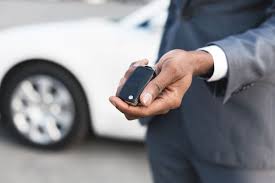Why do car dealers rip you off?
Believe it or not, 8 out of 10 consumers don’t know how to buy a car without being ripped-off.
Getting a good deal is not rocket science, but it does take research to figure out how to do it right. Most people are either lazy or unimformed and aren’t willing to invest their time, even though they can save upwards of $5,000 on a typical deal.
Dealers sell vehicles every single day. They know every type of customer, all their objections, and tactics to pressure and profit from them.
A typical car buyer only buys a car once every 5 to 6 years. There’s no way they’re going to outsmart a dealer without being fully prepared.
But the statistics show that 80% of car shoppers try to negotiate at the dealership instead of doing everything via phone or email. They also finance their cars through the dealership and trade-in their old car without thoroughly shopping it to other dealers.
Of course, dealers love it because those are the 3 main ways they make money off of clueless shoppers.
- The Price of the Vehicle
- The Financing
- The Trade-In
Most car shoppers focus only on negotiating the price of the car. That’s fine with dealers, because they can easily give you a good price while completely ripping you off on the financing and trade-in. If you focus instead on your trade-in, that’s fine too. The dealer will simply raise the price of the car and screw you on the financing.
The main point is that dealers will juggle these 3 profit sources so that you get a good deal on whatever you’re focusing on, while being ripped off on the other two. Always make sure you seperate each transaction into its own negotiation. Don’t let the dealer package everything into one monthly payment.

Get your financing through the credit union before you even step on the lot.
Once a car salesman knows you don’t need financing, they’re more willing to be forward with you and knows they don’t have to work on the payments with you, because it won’t help. We’ll still try to beat whatever APR you’re getting at the bank and offer you payment deals, but forget them. You’ve got it worked out, and only need to know the price – bringing us to the next point.
DON’T HAGGLE OVER ANYTHING BUT THE PRICE.
This seems obvious to most of the readers of The Consumerist, but most people miss this – especially if they’re getting dealer financing.

Spot Delivery Scam
Dealers can also cash in on delivery costs. Some allow potential buyers to leave with a new car before the financing has been finalized. The dealer calls a few days later, telling them the loan has fallen through and the car needs to be returned or it will be repossessed. When returned, the dealership’s finance officer has a different loan at a higher interest rate or larger down payment. This scam is most commonly used against people with bad credit scores because they may not have other options for paying for the car. To avoid this, don’t take delivery of a vehicle until you’ve been fully approved for a loan by the dealer or your bank.
Extended Warranties
Like many things you buy new, an extended warranty isn’t worth the cost. New cars come with manufacturer warranties for the first one to three years, when problems are most likely to arise. Extended warranties only take effect after the basic warranty, also called the factory warranty, expires. They’re backed by a third-party underwriter for coverage you may never need. And even if you do, the money you save on the repairs probably won’t cover the cost of the warranty, according to Consumer Reports. It found the median savings on repairs covered by extended warranties was $837, which can cost $1,200 to $1,500. Car dealers can earn commissions of 50 percent or more on them. Instead, put the money you’d spend on an extended warranty in an emergency fund for car

Higher Financing Costs
If you negotiate a fair price for the car and leave the dealership with little profit on the sales price, the dealer may try to make money through financing and other revenue streams. With in-house financing the dealer will typically shop your loan application to several lenders to see what interest rates you qualify for. If the best interest rate they can find for you is 4 percent, they may come back with a rate 2-4 points higher and keep the extra interest as profit.
The extra interest may be split with the finance company.
You won’t be told of the difference, which won’t affect your monthly payment by much anyway but adds up over the length of the loan.
Here’s an Example: You finance a $25,000 Toyota Tacoma on a 60-month loan that you qualify for at 4 percent interest. The payments would be $460 per month. Increase the rate to 6.5 percent and the monthly payment only goes up from $29 to $489. But over the life of the loan, it adds up to $1,724 more, which is pure profit for the car dealer.
Signs The Car Dealership Is Ripping You Off
DON’T GET TAKEN FOR A RIDE
Plenty of car dealers are honest salespeople who operate with integrity. Others see a big fat bullseye on your back the second you walk through the dealership doors. Dealers negotiate vehicle deals every single day, but you’ve done it once or twice — or maybe never. Face it, they’re probably better at negotiating than you (though there’s good reason to do it all the time). But if you know what to watch out for, you can avoid the most common pitfalls when buying a car.
RUSHING YOU INTO A DEAL
When dealers sense hesitation, they’ll sometimes try to force buyers off the fence by telling them that the deal they offered is only good for that day, or that another buyer is interested in the same car. This is their attempt to force you into an emotion-based decision. If you’re not absolutely sure, be prepared to walk away and sleep on it. There are always more cars and other dealers.
MAKING YOU PAY FOR DEALER PREP
“Dealer prep” is a fee commonly tagged onto itemized bills that unsuspecting buyers are prone to glancing over. Often $500 or $600, the fee supposedly compensates dealers for extra labor they put into securing your vehicle. In reality, it’s a hidden add-on. Beat this scam by examining the purchase receipt and inquiring about every single charge before signing. Negotiate to have the fee reduced or removed entirely.
PROMISING TO PAY OFF YOUR TRADE-IN LOAN — AND FAILING TO
If you can, pay off your existing loan before you trade in your car. But if you must trade in a car that you owe money on, the balance of the first loan will be added to the loan on the car you’re buying because the dealer is supposed to pay off whatever is owed on the trade-in. Sometimes, however, they simply keep the extra money. In the end, the bank loaned you the money for the vehicle and it’s you — not the shady dealer — who is responsible for paying it.